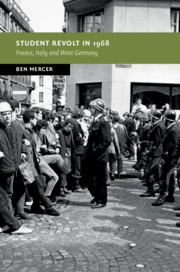Book contents
- Student Revolt in 1968
- New Studies in European History
- Student Revolt in 1968
- Copyright page
- Contents
- Acknowledgements
- Abbreviations
- Introduction: History, Myth and Memory of 1968
- Part I Education and Culture
- Part II The Politics of Revolt
- Chapter 5 ‘The Space of Autonomy Must Be Created’
- Chapter 6 ‘We Represent Nothing’
- Chapter 7 ‘We Began to Talk’
- Part III Crisis of the University
- Conclusion
- Select Bibliography
- Index
Chapter 6 - ‘We Represent Nothing’
The Crisis of Representation
from Part II - The Politics of Revolt
Published online by Cambridge University Press: 18 November 2019
- Student Revolt in 1968
- New Studies in European History
- Student Revolt in 1968
- Copyright page
- Contents
- Acknowledgements
- Abbreviations
- Introduction: History, Myth and Memory of 1968
- Part I Education and Culture
- Part II The Politics of Revolt
- Chapter 5 ‘The Space of Autonomy Must Be Created’
- Chapter 6 ‘We Represent Nothing’
- Chapter 7 ‘We Began to Talk’
- Part III Crisis of the University
- Conclusion
- Select Bibliography
- Index
Summary
Chapter 6 describes the crisis of representative politics in the mid- to late 1960s, at the national level, the level of youth organisation, and within the university. This crisis prompted a turntowards the occupation as a political tactic, the general assembly over representative organisations, and a preference for forms of direct democracy. The protest movements demanded autonomy, although they were not always clear how this would operate. However, forms of direct democracy such as the occupation had a short life-span and generated criticism for demagogy and its domination by student leaders. I argue that the protest movements found it difficult to reconcile their anti-hierarchical drive and the intense politicisation that led towards formation of a new political party.
Keywords
- Type
- Chapter
- Information
- Student Revolt in 1968France, Italy and West Germany, pp. 130 - 154Publisher: Cambridge University PressPrint publication year: 2019

